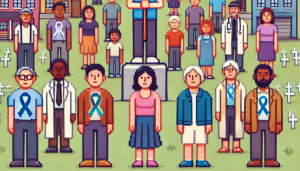
How Online Views on Cannabis Could Shape Public Health
Picture a local health department worker preparing talking points for a city council hearing. Community members will testify about cannabis zoning, medical access, and recreational sales. The worker knows they’ll need to balance equity, economics, and public health—but what’s less clear is how residents actually perceive the risk of cannabis. Traditional surveys take months. Today, that worker scrolls social media for clues.
A new study published in JMIR Infodemiology shows why that instinct matters. By analyzing more than 250,000 cannabis-related tweets across five continents, researchers revealed how online discourse is reshaping perceptions of cannabis use and legalization.
Why This Matters Now
Cannabis is the third most used drug worldwide after alcohol and tobacco. In 2021, 219 million people, about 4% of the global population, used cannabis. Public health risks range from substance use disorders to traffic accidents, cardiovascular disease, and mental health impacts like depression or psychosis.
Yet legalization is expanding rapidly. More than 40 countries now allow cannabis for medical or recreational use. As policy shifts, perceptions of risk are falling. This is where social media comes in: it offers a window into what communities believe, often faster than any survey.
What the Study Found
Methods in Brief
Researchers collected tweets from 2018 to 2022, using terms like cannabis, marijuana, and hashish. They included only tweets with 10 or more retweets (a proxy for relevance). Using machine learning and content analysis, they coded tweets by topic, tone, and stance on legalization.
Key Results
- Where debates happen:
- America, Europe, Asia → Most tweets centered on political debate.
- Oceania and Africa → Personal stories and experiences dominated.
- Tone of experiences:
Across all continents, positive personal experiences outweighed negative ones. Oceania stood out: 61% of tweets were positive. - Support for legalization:
- Oceania: 68% of tweets favored legalization.
- America: 59% in favor.
- Africa: 54% in favor.
- Europe & Asia: About 48% in favor—closer to a split.
The Takeaway
The loudest voices online are supportive and optimistic about cannabis. That imbalance suggests health risks—from dependency to impaired driving—may be underplayed in the public conversation.
What This Means for Practice
1. Public Health Communication
Social media is shaping perceptions faster than traditional media or policy briefings. If positive narratives dominate, health departments and NGOs risk losing ground in explaining real risks. Action: Integrate social listening into routine surveillance to detect emerging narratives early.
2. Policy and Equity
In Europe and Asia, the nearly even split in tweets signals contested policy environments. Policymakers there may face sharper divides—and misinformation could easily tip public opinion. Action: Use community forums and trusted messengers to balance debate with evidence.
3. Youth and Risk Perception
Studies show adolescents are especially vulnerable to cannabis marketing and peer influence. If online spaces trivialize harms, youth may underestimate risks. Action: Build prevention campaigns that speak directly in the languages and memes of social platforms.
4. Implementation Science Link
This study is a case of infodemiology—using online data to guide public health strategy. Health agencies can adopt similar mixed-methods approaches for opioids, vaping, or vaccine sentiment.
Barriers and Challenges
- Political and financial: Social media monitoring requires staff, training, and budgets not all agencies can spare.
- Systemic: Public debates often prioritize economics (tax revenue, jobs) over health, making it more challenging to focus on risk.
- Equity: Twitter users skew younger, urban, and educated; rural and marginalized voices may be underrepresented.
What’s Next
Future work could expand beyond English and Spanish tweets, capture more nuanced slang, and link attitudes to actual health outcomes. For practitioners, the immediate step is clear: don’t ignore the online debate.
By weaving social media analysis into program planning, agencies can anticipate shifts in perception, identify at-risk groups, and craft interventions that resonate before misconceptions spread.
Join the Conversation
- How could your organization use social media insights to shape cannabis education?
- What barriers might stop your team from integrating social listening into prevention programs?
- Does the predominance of positive stories online change how you think about legalization debates?



